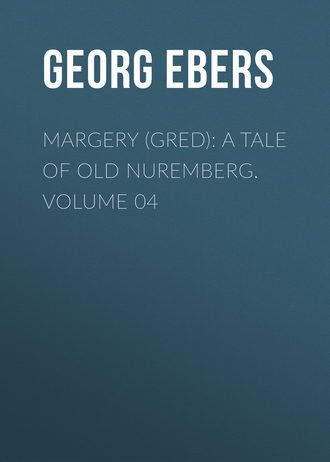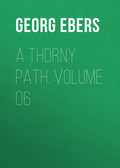
Georg Ebers
Margery (Gred): A Tale Of Old Nuremberg. Volume 04
"And the Farmer's daughter in 'Poor Heinrich,'" I said, "who gladly gave her young blood to save her plighted lord from leprosy."
Thus had my aunt gained her end; but when she strove to carry Ann away from her home and kindred, and keep her in the forest as her own child— to which Master Pernhart and his mother gave their consent—she failed in the attempt. Ann was steadfast in her desire to remain with her mother and the children, and more especially with her deaf and dumb brother, Mario. If my aunt should at any time need her she had but to command her, and she would gladly go to her, this very day if she desired it; howbeit duly to work out her spinning—and by this she meant that she bore Riklein in mind—she must ever do her part for her own folk, with a clear conscience.
Thus it was fixed that Ann should go to the Forest lodge to stay till Christmas and the New Year were past, only she craved a few hours delay that she might remove all doubt from the Magister's mind. I offered to take upon myself this painful task; but she altogether rejected this, and how rightly she judged was presently proved by her cast-off suitor's demeanor; inasmuch as he was ever after her faithful servant and called her his gracious work-fellow. When she had told him of her decision he swore, well-nigh with violence, to become a monk, and to make over his inheritance to a convent, but Ann, with much eloquence, besought him to do no such thing, and laid before him the grace of living to make others happy; she won him over to join our little league and whereas he confessed that he was in no wise fit for the life, she promised that she would seek out the poor and needy and claim the aid only of his learning and his purse. And some time after she made him a gift of an alms-bag on which she had wrought the words, "Ann, to her worthy work-fellow."
Here I am bound to tell that, not to my aunt alone, but to me likewise did the good work which the old organist had pointed out to my friend, seem a vain imagining when it had led her to accept a lover whom she loved not. But when it became a part of her life, stripped of all bigotry or overmuch zeal, and when the old musician had led us to know many poor folks, it worked right well and we were able to help many an one, not alone with money and food, but likewise with good counsel and nursing in sore need. Whenever we might apply to the Magister, his door and purse alike were open to us, and peradventure he went more often to visit and succor the needy than he might otherwise have done, inasmuch as he thereby found the chance of speech with his gracious "work-fellow," of winning her praises and kissing her hand, which Ann was ever fain to grant when he had shown special zeal.
We were doubtless a strange fellowship of four: Ann and I, the organist and Master Peter, and, albeit we were not much experienced in the ways of the world, I dare boldly say that we did more good and dried more tears than many a wealthy Abbey.
At the New Year I followed Ann to the forest, and helped to grace the hunter's board "with smart wenches;" and when she and I came home together after Twelfth day, she found that the forward apprentice had quitted her step-father's house. Not only had my aunt told old Dame Magdalen of his ill-behaving, but his father at Augsburg was dead, and so Pemhart could send him home to the dwelling he had inherited without disgracing him. Yet, after this, he made so bold as to sue for Ann in a right fairly written letter, to which she said him nay in a reply no less fairly written.
CHAPTER XVII
A thoughtful brain could never cease to marvel at the wonders which happen at every step and turn, were it not that due reflection proves that strange events are no less necessary and frequent links in the mingled chain of our life's experience than commonplace and every-day things; wherefor sheer wonder at matters new to our experience we leave for the most part to children and fools. And nevertheless the question many a time arose in my mind: how a woman whose heart was so truly in the right place as my aunt's could cast off her only son for the cause of an ill-match, and notwithstanding strive with might and main to remove all hindrances in the way of another such ill-match.
This indeed brought to my mind other, no less miracles. Thus, after Ann's home-coming, when I would go to see her at Pernhart's house, I often found her sitting with the old dame, who would tell her many things, and those right secret matters. Once, when I found Ann with the old woman from whom she had formerly been so alien, they were sitting together in the window-bay with their arms about each other, and looking in each other's face with loving but tearful eyes. My entrance disturbed them; Dame Magdalen had been telling her new favorite many matters concerning her son's youthful days, and it was plain to see that she rejoiced in these memories of the best days of her life, when her two fine lads had ever been at the head of their school. Her eldest, indeed, had done so well that the Lord Bishop of Bamberg, in his own person, had pressingly desired her late departed husband to make him a priest. Then the father had apprenticed Ulman to himself, and dedicated the elder, who else should have inherited the dwelling-house and smithy, to the service of the Church, whereupon he had ere long risen to great dignity.
None, to be sure, listened so well as Ann, open-eared to all these tales, and it did old Dame Magdalen good to see the maid bestir herself contentedly about the house-keeping; but her changed mind proceeded from yet another cause. My aunt had done a noble deed of pure human kindness, of real and true Christian charity, and the bright beam of that love which could drag her feeble body out into the winter's cold and to her foe's dwelling, cast its light on both these miracles at once. This it was which had led the high-born dame to cast aside all the vanities and foolishness in which she had grown up, to the end that she might protect a young and oppressed creature whom she truly cared for from an ill fate. Yea, and that sunbeam had cast its light far and wide in the coppersmith's home, and illumined Ann likewise, so that she now saw the old mother of the household in a new light.
When the very noblest and most worshipful deems it worthy to make a great sacrifice out of pure love for a fellow-creature, that one is, as it were, ennobled by it; it opens ways which before were closed; and such a way was that to old Dame Magdalen's heart, who now, on a sudden, bethought her that she found in Ann all she had lost in her well-beloved grandchild Gertrude.
Never had Ann and I been closer friends than we were that winter, and to many matters which bound us, another was now added—a sweet secret, concerning me this time, which, strange to tell, drew us even more near together.
The weeks before Lent presently came upon us; Ann, however, would take part in no pleasures, albeit she was now a welcome guest, since her step- father was a member of the worshipful council. Only once did she yield to my beseeching and go with me to a dance at a noble house; but whereas I perceived that it disturbed her cheerful peace of mind, although she was treated with hearty respect, I troubled her no more, and for her sake withdrew myself in some measure from such merry-makings.
After Easter, when the spring-tide was already blossoming, my soul likewise went forth to seek joy and gladness, and now will I tell of the new marvel which found fulfilment in my heart.
A grand dance was to be given in honor of certain ambassadors from the Emperor Sigismund, who had come to treat with his Highness the Elector and the Town Council as to the Assembly of the States to be held in the summer at Ratisbon, at the desire of Theodoric, Archbishop of Cologne. The illustrious chief of this Embassy, Duke Rumpold of Glogau in Silesia, had been received as guest in a house whither, that very spring, the eldest son had come home from Padua and Paris, where he had taken the dignity of Doctor of Ecclesiastical and Civil Laws with great honors, and he it was who first moved my young heart to true love.
As a child I had paid small heed to Hans Haller, as a lad so much older that he overlooked little Margery, and by no means took her fancy like Cousin Gotz; thus he came upon me as one new and strange.
He had dwelt five years in other lands and the first time ever I looked into his truthful eyes methought that the maid he should choose to wife was born in a lucky hour.
But every mother and daughter of patrician rank doubtless thought the same; and that he should ever uplift me, giddy, hasty Margery, to his side, was more than I dared look for. Yet, covertly, I could not but hope; inasmuch as at our first meeting again he had seemed well-pleased and amazed at my being so well-favored, and a few days later, when many young folks were gathered together at the Hallers' house, he spoke a great while and right kindly with me in especial. Nor was it as though I were some unripe child, such as these young gentlemen are wont to esteem us maids under twenty—nay, but as though I were his equal.
And thus he had brought to light all that lay hid in my soul. I had answered him on all points freely and gladly; yet, meanwhile, I had been on my guard not to let slip any heedless speech, deeming it a precious favor to stand well in the opinion of so noble and learned a gentleman.
And presently, when it was time for departing, he held my hand and pressed it; and, as he wrapped me in my cloak, he said in a low voice that, whereas he had thought it hard to make himself at home once more in our little native town, now, if I would, I might make Nuremberg as dear— nay, dearer to him than ever it had been of yore; and the hot blood boiled in my veins as I looked up at him beseechingly and bid him never mock me thus.
But he answered with all his heart that it was sacred earnest and that, if I would make home sweet to him and himself one of the happiest of mankind, I must be his, inasmuch as in all the lands of the earth he had seen nought so dear to him as the child whom he had found grown to be so sweet a maid, and, quoth he, if I loved him never so little, would I not give him some little token.
I looked into his eyes, and my heart was so full that no word could I say but his Christian name "Hans," whereas hitherto I had ever called him Master Hailer. And meseemed that all the bells in the town together were ringing a merry peal; and he understood at once the intent of my brief answer, and murmured right loving words in mine ear. Then did he walk home with me and Cousin Maud; and meseemed the honored mothers among our friends, who were wont so to bewail my loneliness as a motherless maid, had never looked upon me with so little kindness as that evening which love had made so blessed.
By next morning the tidings were in every mouth that a new couple had plighted their troth, and that the Hallers' three chevronells were to be quartered with the three links of the Schoppers.
Ann was the first to be told of my happiness, and whereas she had hitherto been steadfastly set on eschewing the great dances of the upper class so long as she was unwed, this time she did our will, for that she had no mind to spoil my pleasure by her absence.
Thus had Love taken up his abode with me likewise; and meseemed it was like a fair, still, blooming morning in the Forest. A pure, perfect, and peaceful gladness had opened in my soul, a way of seeing which lent sweetness and glory to all things far and wide, and joyful thanksgiving for that all things were so good.
As I looked back on that morning when Ann had flown to Herdegen's breast, and as I called to mind the turmoil of passion of which I had read in many a poem and love-tale, I weened that I had dreamed of somewhat else as the first blossoming of love in my heart, that I had looked to feel a fierce and glowing flame, a burning anguish, a wild and stormy fever. And yet, as it had come upon me, methought it was better; albeit the sun of my love had not risen in scarlet fire, it was not therefore small nor cool; the image of my dear mother was ever-present with me; and methought that the love I felt was as pure and fair as though it had come upon me from her heavenly home.
And how loving and hearty was the welcome given me by my lover's parents, when they received me in their noble dwelling, and called me their dear daughter, and showed me all the treasures contained in the home of the Hallers'. In this fine house, with its broad fair gardens—a truly lordly dwelling, for which many a prince would have been fain to exchange his castle and hunting demesne—I was to rule as wife and mistress at the right hand of my Hans' mother, whose kind and dignified countenance pleased me well indeed, and by whose friendly lips I, an orphan, was so glad to be called "Child" and daughter. Nor were his worshipful father and his younger brethren one whit less dear to me. I was to become a member—nay, as the eldest son's wife, the female head—of one of the highest families in the town, of one whose sons would have a hand in its government so long as there should be a town-council in Nuremberg.
My lover had indeed been elected to sit in the minor council soon after his homecoming, being no longer a boy, but near on thirty years of age. And his manners befitted his years; dignified and modest, albeit cheerful and full of a young man's open-minded ardor for everything that was above the vulgar. With him, for certain, if with any man, might I grow to be all I desired to become; and could I but learn to rule my fiery temper, I might hope to follow in the ways of his mother, whom he held above all other women. The great dance, of which I have already made mention, and whither Ann had agreed to come with us, was the first I should go to with my well-beloved Hans. The worshipful Council had taken care to display all their best bravery in honor of the Emperor's envoys; they had indeed allied themselves with the constable of the Castle, the Prince Elector, to do all in their power to have the Assembly held at Nuremberg, rather than at Ratisbon, and to that end it was needful to win the good graces of the Ambassadors.
All the patricians and youth of the good city were gathered at the town- hall, and the beginning of the feast was pure enjoyment. The guests were indeed amazed at the richness of our great hall and civic treasure, as likewise at the brave apparel and great show of jewels worn by the gentlemen and ladies.
There were six envoys, and at their head was Duke Rumpold of Glogau; but among the knights in attendance on him I need only name that very Baron Franz von Welemisl who had been so sorely hurt out in the forest garden for my sake, and a Junker of Altmark, by name Henning von Beust, son of one of the rebellious houses who strove against the customs, laws, and rights over the marches, as claimed by our Lord Constable the Elector.
Baron Franz was now become chamberlain to the emperor and, albeit cured indeed of his wounds, was plagued by a bad cough. Still he could boast of the same noble and knightly presence as of old, and his pale face, paler than ever I had known it, under his straight black hair, with the feeble tones of his soft voice, went right to many a maiden's heart; also his rich black dress, sparkling with fine gems, beseemed him well.
Presently, when he saw that Hans and I were plighted lovers, he feigned as though his heart were stricken to death; but I soon perceived that he could take comfort, and that he had bestowed the love he had once professed for me, with compound increase on Ursula Tetzel. She was ready enough to let him make love to her, and I wished the swarthy courtier all good speed with the damsel.
A dancing-hall is in all lands a stew full of fish, as it were, for gentlemen from court, and Junker Henning von Beust had no sooner come in than he began to angle; and whereas Sir Franz's bait was melancholy and mourning, the Junker strove to win hearts by sheer mirth and bold manners.
My lover himself had commended him to my favor by reason that the gentleman was lodging under his parents' roof; and he and I and Ann had found much pleasure these two days past in his light and openhearted friendliness. Nought more merry indeed might be seen than this red- haired young nobleman, in parti-colored attire, with pointed scallops round the neck and arm-holes, which fluttered as he moved and many little bells twinkling merrily. Light and life beamed forth out of this gladsome youth's blue eyes. He had never sat at a school-desk; while our boys had been poring over their books, he had been riding with his father at a hunt or a fray, or had lurked in ambush by the highway for the laden wagons of those very "pepper sacks"—[A nickname for grocery merchants]– whose good wine and fair daughters he was so far from scorning in their own town-hall.
He had already fallen in love with Ann at the Hallerhof, and never quit her side although, after I had overheard certain sharp words by which Ursula Tetzel strove to lower the maid in his opinion, I told him plainly of what rank and birth she was.







